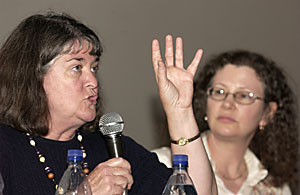 |
|
CHRIS CODUTO / Arizona Daily Wildcat
|
Journalism department head Jacqueline Sharkey answers a question from an audience member about the movie "Control Room" at the Loft Cinema Friday night. The panel discussion was hosted by the Center for Middle Eastern Studies and the Tucson Cinema Foundation.
|
|
|
By Mitra Taj
Arizona Daily Wildcat
Monday, August 30, 2004
Print this
After a screening of "Control Room," a documentary that follows Arab news network Al-Jazeera's staff members as they report on the war in Iraq, UA professors said the film exposed the weaknesses of the American government and media.
Following the screening Friday night at the Loft Cinema, three professors participated in a panel discussion presented by the UA's Center for Middle Eastern Studies, and the Tucson Cinema Foundation.
Leila Hudson, assistant professor of Near Eastern studies, said parts of the film were "paralyzing." She was particularly affected by a scene in which an Al-Jazeera war correspondent was depicted minutes before he was killed by an American missile strike.
"We have to remember it was followed in two days by the taking of Baghdad," she said of the missile attack, one of three that mistakenly targeted news centers and killed journalists that day.
David Gibbs, associate history professor, said the film spotlights a disturbing paradox.
"America has the freest press in the world, at least legally, but for the most part (it doesn't) publish things critical of the government," Gibbs said.
Gibbs said the reluctance of the U.S. media to aggressively examine the government is a result of the American press acting as part of the political system rather than criticizing it.
This makes the press vulnerable to propaganda campaigns by the government, he said.
Jacqueline Sharkey, journalism department head, said embedding reporters in military operations, widely viewed as a step toward more media access in the battlefield, was unethical and only intensified feelings of identification with the military.
"We were not emotionally aligned with the Iraqi people at all," Sharkey said. "Television fell in love with images of journalists in combat, and we never saw the human cost of war. And it's because the human cost of war has a political side effect."
Sharkey said "objectivity" means establishing a professional distance when reporting and allowing the most honest and complete story to be told.
"I'm tired of hearing about both sides of the story," Sharkey said. "What about the third and the fourth and the fifth?"
After the discussion, Jeffrey Portouw, a computer science junior, agreed that the media doesn't always dig deep enough.
"Most of what we see is just one point of view, and that in no way captures the entire picture," said Portouw, one of about 600 in attendance.
Sharkey said the major American networks featured computer screens of bombings and plans of attacks.
"We saw the relentless presence of military operations with a complete exclusion of civilian casualties," said Sharkey of the U.S. networks. "It looked like a damn video game."
The adaptation of the American flag and "Operation Iraqi Freedom" graphics on some news stations broke the ethical rules of journalism, said Sharkey, who teaches the journalism department's media ethics course.
David Morales, an applied mathematics grad student, said the drive to entertain and serve corporate interests makes for a more ignorant populace.
Portouw said commercial pressure on the media produces coverage that is in tune with what people want to hear.
"They have an obligation to shareholders to turn a profit," he said. "It has to be entertaining."
But Morales said he hopes America's fascination with reality TV will spark an interest in documentaries. "I hope this film and films like it become more and more popular."
Sharkey said she hopes "Control Room" will stimulate dialogue about the role of the press.
